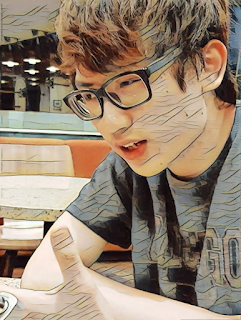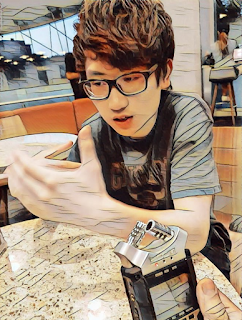Our subject is passionate Hong Konger Jeffrey Ngo (敖卓軒, pictured), who in his young age (he's in his early 20s, just about to complete a Master's thesis in history on Hong Kong at New York University), has already become a published op ed writer in the mainstream western media. With well-known Hong Kong youthful student leader Joshua Wong (黃之鋒), Ngo co-wrote an op ed this past May for the New York Times urging support for U.S. Senate legislation, the "Hong Kong Human Rights and Democracy Act". In January, they had also collaborated in an op ed on Hong Kong for the Washington Post. In fact, their essay in the World Policy Blog last October on how Hong Kong lost its right to self-determination as a British Colony under UN scrutiny caused a major furor for China. The duo were roundly attacked for bringing up the topic by Beijing Foreign Office diplomat Song Zhe (宋哲) in an op ed in the Wall Street Journal.
And as researcher with Demosistō (香港眾志), a new political party in Hong Kong, he has been the historian behind Wong, the party's secretary general, collaborating with him on other essays as well as on a crowd-funding page to raise money for a proposed online archive of government documents (from UK, U.S.,Taiwan and Hong Kong) relating to the status of Hong Kong, including its future. He is part of an ambitious 'Decoding Hong Kong's History" emerging project to collect such government archival documents from around the world. As of today, the group has raised 40% of its goal of HK$500,000. With 30 more years to go within the 50 years envisioned under the terms of the treaty that turned Hong Kong to China, uncovering the past is the key to envisioning the future. Ngo and his comrades in his party hope to prepare Hong Kongers for an anticipated referendum within the next 30 years to determine their own future.
In our hour-long interview, we discussed the importance of government records, why he believes they should be publicly accessible, and why researching the past makes sense in understanding why Hong Kong was turned over to an authoritarian regime 20 years ago (during the "Handover").
We also discussed "Joshua: Teenager vs Superpower", the documentary on Wong now released on Netflix, which I saw with a dozen or so others at the Los Angeles Asian Pacific American Film Festival a few months earlier at the CGV in Koreatown, Los Angeles. Predictably, he is a booster of his friend's film, calling it an "excellent" way to let western audiences know about the political situation faced by democracy advocates in Hong Kong.
We also discussed Ngo's expertise in exposing the fact that although Hong Kong was still a British Colony (and hence subject to the Special Committee on Decolonization of the United Nations) when the Peoples Republic of China took Taiwan's seat in the United Nations, China managed to get the UN to delist Hong Kong from the list of territories up for decolonization. And this was in 1972, two-and-a-half decades prior to the 1997 Handover.
Ngo believes the Tanzania chair of the committee incorrectly implied that the committee had voted to do so. There was in fact no roll call vote on that particular issue by the UN General Assembly. He notes that China had just built a railroad in the African country, so no doubt Huang Hua, the UN representative from China, was able to influence the chair of the committee.
The interview was conducted last month at NYU after a nice Thai dinner in nearby Greenwich Village, as marchers commemorating the Pulse nightclub massacre were gathering a few blocks away. Since then, his party's sole Legislative Council elected official (Nathan Law, the youngest -- at 23 -- ever elected last year) together with three other pro-democracy legislators have sadly been "disqualified" in a Beijing-influenced judicial decision. -- Daniel C. Tsang, Subversity Show host.
Art enhanced photos of Jeffrey Ngo © Copyright 2017 Daniel C. Tsang


